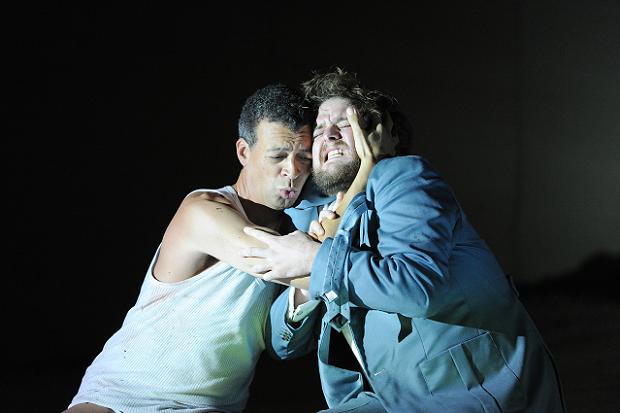Castor and Pollux (ENO) Opera
Classical & Opera, New in Ceasefire - Posted on Thursday, October 27, 2011 7:46 - 0 Comments
By Paul Guest
Allan Clayton and Roderick Williams as Castor and Pollux, performed by The English National Opera at The London Coliseum – Photo Credit: Alastiar Muir
Jean-Philippe Rameau Castor and Pollux, English National Opera.
I was thrilled to hear this was to take place this season. Of course, that an early French opera is performed in a London venue is itself something of a rarity these days. However, based on this showing, my frequent trips to France to hear Rameau’s works performed to their full extent will, alas, have to continue. This production has flaws.
The staging, designed by Katrin Lea Tag, is an Ikea-inspired box of very plain panelled wood, allowing Barrie Kosky’s direction to shine, as it did. The giant mud mound that appears on stage gave the drama greater depths in many literal senses. For instance, earth represented… earth and became central to the movement of the piece.
I had already heard that this production was to involve nudity, so I braced myself slightly, though my “feat”, amusing or not, is perhaps no longer a feat with many directors and audiences embracing the human body. Of course, this is hardly the first time we’ve seen flesh in opera, yet I found myself questioning its use in this production. I simply wasn’t sure why it was there.
I also found myself questioning Kosky’s tendency to lean toward a very sexually orientated performance. Yes, of course baroque librettos are full of sexual nature, but surely not this directly so? They are, to my mind, meant to be subtle, hidden behind a mask of metaphorically and mostly unclear phrases, and thus more powerfully suggestive than anything. I even sifted through the original French libretto to look for any particular reasons for the emphasise on the sexual narrative of the libretti, to no avail. Of course, this isn’t to say I didn’t enjoy the fresh attitude and the entertainment of an opera that brought Rameau’s score back to life. On the contrary, I relished this new approach. Kosky’s production saw a good use of dirt both on and off the page.
The orchestra were, rather unfortunately, second rate, conducted by Christian Curnyn. Even though, at various points, they did fire some oomph into the score, there were nonetheless some incredibly odd entries, notably from the woodwind and brass sections who seemed to make their entry whenever they felt like it.
His orchestra clearly lost, Maestro Curnyn still valiantly, and quite brilliantly, managed to salvage what he could. The chorus were in the same boat as the orchestra, this time through a lack of clarity in their singing: nothing was clear. They sang lines in almost a legato manner at which point they lost touch with the score and inevitably Rameau himself. From the first few phrases, I loathed the English translation, and that is all there is to be said, I wish they’d kept it in French.
In stark contrast to orchestra and chorus, Allan Clayton and Roderick Williams, as Castor and Pollux, stole the show with their immaculate singing, brilliantly polished from the opening act. Their voices rang out into the auditorium, making a rather tidy job of the vast beauties of Rameau’s vocal line. Sophie Bevan, too, as the lost and longing Télaïre, glistens, though I believe she wasn’t decorative enough. There seemed to be quite a few moments of wasted embellishment. Ed Lyon flew to new heights singing the role of Mercury.
My expressions of discontent toward the musical treatment of this production, though strong, should not be taken too hard. I actually rather enjoyed this new, quirky staging. Next time, though, let’s just keep it French chaps? Ça marche?
Until 1st December 2011, www.eno.org



Leave a Reply